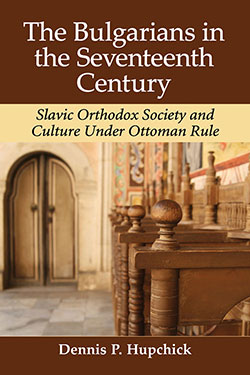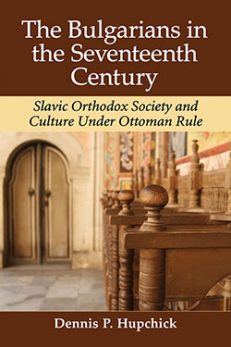Subtotal: $31.99
The Bulgarians in the Seventeenth Century
Slavic Orthodox Society and Culture Under Ottoman Rule
Original price was: $39.95.$19.99Current price is: $19.99.
In stock
About the Book
Through Bulgarian and Ottoman documents, marginalia, travelers’ accounts, art, and numerous secondary documents, the seventeenth century—considered by historians as the nadir of Bulgarian national history—is examined as to the question of the Slavic society’s continued existence despite centuries of foreign political, social and spiritual domination by the Ottoman Empire.
The first part outlines the consequences for Bulgarian history of the Muslim Ottoman conquest. The second details the nature of the culture and the forms of expression. The third part consists of an overview of documented seventeenth century Bulgarian Orthodox expression.
About the Author(s)
Bibliographic Details
Dennis P. Hupchick
Format: softcover (6 x 9)
Pages: 342
Bibliographic Info: 9 maps, 26 tables, glossary, notes, bibliography, index
Copyright Date: 2014 [1993]
pISBN: 978-0-7864-9350-0
Imprint: McFarland
Table of Contents
Table of Contents
List of Maps and Tables vii
Author’s Preface ix
Acknowledgments xii
Note on Transliteration and Spelling xiii
Abbreviations xv
Maps xix
Introduction 1
One: The Bulgarians in Seventeenth Century Ottoman Society
1. The Social Position of the Bulgarians 13
Demographic Overview 13
The Rural Situation: Common and Privileged Reaya 18
The Urban Situation: Artisans and Merchants 37
Social Institutions and Cultural Life 50
2. Threats to Bulgarian Orthodox Culture Posed by Ottoman Society 57
Conversions to Islam and Muslim Reaction 57
Greek Domination of the Orthodox Church Hierarchy 66
Roman Catholic Missionary Efforts 73
Two. Seventeenth Century Bulgarian Orthodox Culture: Nature and Forms
3. Monasticism and the Cultural Role of Mount Athos 87
4. Slavic Education: The Foundation for Cultural Expression 99
5. The Forms of Orthodox Culture 109
Writing and Literature 109
Religious Art 127
Three. Seventeenth Century Bulgarian Orthodox Culture: Expression
6. Major Centers of Orthodox Cultural Activity 143
Rila Monastery 143
Sofia 152
Etropole Monastery 165
Vratsa 174
Karlovo, Adzhar and Kuklen Monastery 178
Conclusions
Overview of Extant Evidence 183
General Summary 190
Appendix I: Glossary 201
Appendix II: Statistical Tables 207
Appendix III: Chronology 225
Notes 233
Bibliography 269
Index 299
Book Reviews & Awards
“Hupchick’s principal objective is to assess the degree to which Bulgarian society retained an individual identity during the 17th century…a useful profile of Christian Society under Ottoman rule”—Choice; “Hupchick’s study of seventeenth-century Bulgarian cultural history is a major work. It is based on a sound methodological approach, emphasizing quantitative analysis, and is written in a crisp narrative style that is never dull…will be a standard text for many years to come”—The Slavonic Review; “this book is a study of cultural survival in the Ottoman Empire. This study is an invaluable addition to our understanding of Bulgaria”—The Historical Association; “the publisher…should be commended for producing a very handsome volume”—Slavic Review; “fills a large historical void…offers a fascinating insight into an under-studied area of Bulgarian history…welcomed and valued by all students of Balkan history”—English Historical Review.

 Show Business Homicides
Show Business Homicides 




